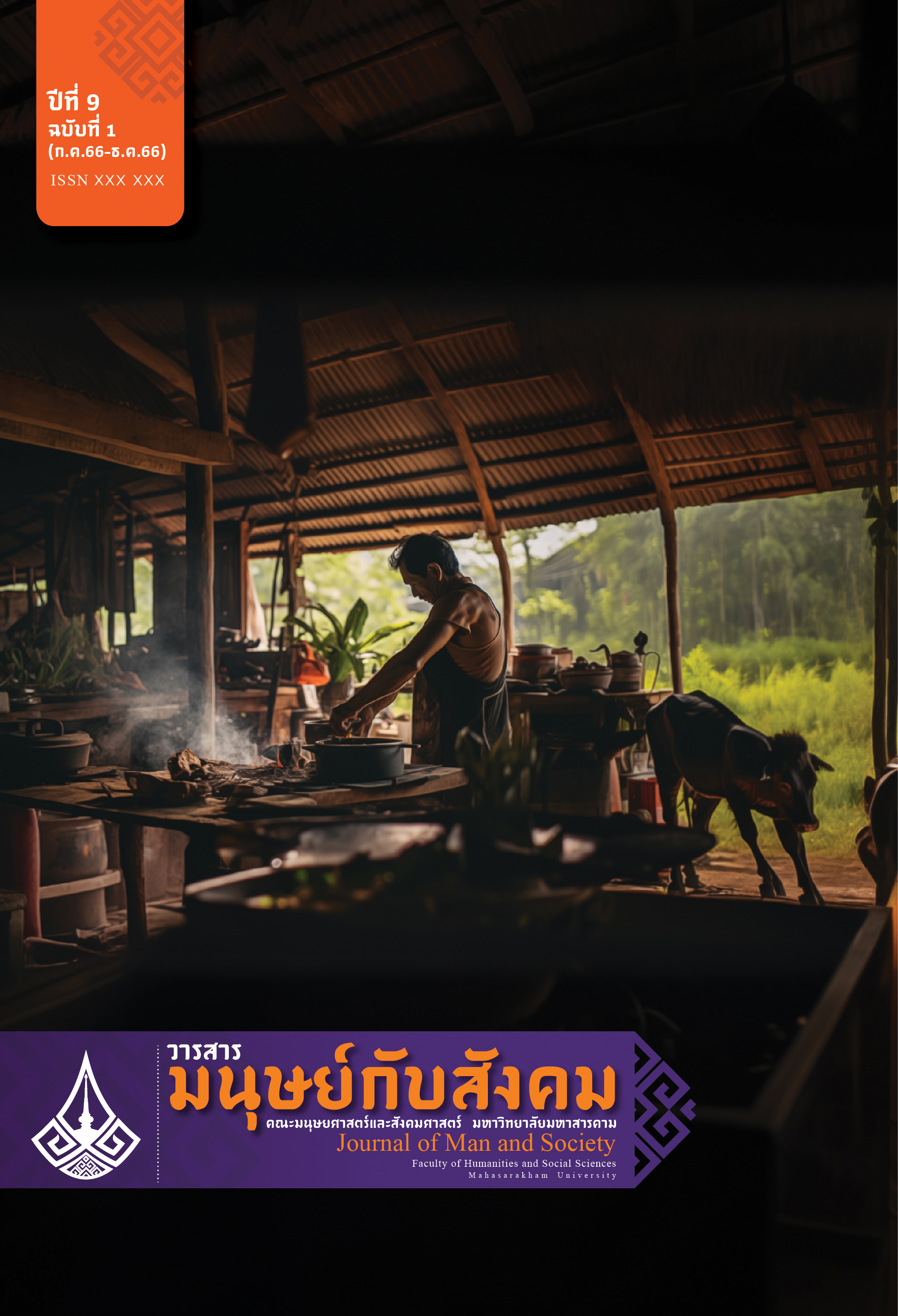อัตวิสัยทางเพศและเพศวิถีของผู้หญิงโสดในสังคมเมือง : การวิจัยเชิงคุณภาพ
Main Article Content
บทคัดย่อ
การวิจัยเชิงคุณภาพเรื่องนี้มีวัตถุประสงค์เพื่อศึกษาตัวตนความเป็นคนโสดอัตวิสัยทางเพศ เพศวิถี สุขภาพทางเพศ และการต่อรองต่อต้านในเรื่องเพศวิถีของผู้หญิงโสดในสังคมเมือง โดยใช้แนวคิดเพศภาวะ เพศวิถี แนวคิดตัวตนและอัตวิสัย และแนวคิดสุขภาวะทางเพศเป็นกรอบในการศึกษา ใช้ระเบียบวิธีการวิจัยเชิงคุณภาพ เก็บข้อมูลผ่านการสัมภาษณ์เชิงลึกกับหญิงโสด อายุระหว่าง 29-45 ปี จำนวน 8 คน วิเคราะห์ข้อมูลด้วยการวิเคราะห์เชิงเนื้อหา
ผลการศึกษา พบว่า การย้ายถิ่นมาสู่เมืองทำให้ผู้หญิงโสดพบกับพื้นที่ใหม่ที่เปิดโอกาสให้เรียนรู้เกิดความก้าวหน้า และหล่อหลอมให้มีอิสระทางความคิด พฤติกรรม ตลอดจนการสั่งสมทุุนทางเศรษฐกิจ และเกิดการนิยามความโสดเป็นสถานะอย่างหนึ่ง จุดมุ่งหมายในชีวิตกับคู่ความสัมพันธ์ที่เกิดขึ้นไม่ใช่เพื่อการสร้างครอบครัว แต่เป็นการแสวงหาความมั่นคงทางเศรษฐกิจ ให้ความสำคัญกับการศึกษาและการงานแทน นำมาสู่การแสดงออกตัวตนและการนิยามเพศที่ไม่จำกัดเพียงชายหรือหญิง แต่ขึ้นอยู่กับความพึงพอใจ ซึ่งมีความลื่นไหลไปมาเสมอ ด้านสุุขภาวะทางเพศตระหนักสิทธิเรื่องเพศ และมีพฤติกรรมทางเพศรื่นรมย์ เป็นสุข และปลอดภัย ซึ่งเกิดขึ้นกับคู่ความสัมพันธ์ โดยมักเเสดงออกผ่านการใช้ชีวิตอยู่ร่วมกัน และพููดคุุย โดยอาจไม่พัฒนาสู่การมีเพศสัมพันธ์และมีการต่อต้านต่อรอง โดยมีการรับรู้และป้องกันความคิด ความรู้สึกต่อมุมมองของสังคมในรูปแบบการให้คุณค่าในตนเอง ผ่านการพัฒนาตนเอง และการมองความสัมพันธ์ทางเพศเป็นเรื่องการแลกเปลี่ยนผลประโยชน์ที่ตนเองไม่ได้ตกเป็นรองฝ่ายเดียว
Article Details

อนุญาตภายใต้เงื่อนไข Creative Commons Attribution-NonCommercial-NoDerivatives 4.0 International License.
เนื้อหาและข้อมูลที่ตีพิมพ์ลงในวารสารมนุษย์กับสังคม ถือเป็นข้อคิดเห็นและความรับผิดชอบโดยตรงของผู้เขียนซึ่งกองบรรณาธิการวารสารไม่จำเป็นต้องเห็นด้วยหรือร่วมรับผิดชอบใดๆ
บทความ ข้อมูล เนื้อหา รูปภาพ ฯลฯ ที่ได้รับการตีพิมพ์ในวารสารมนุษย์กับสังคม ถือเป็นลิขสิทธิ์ของวารสาร หากบุคคลหรือหน่วยงานใดต้องการนำทั้งหมดหรือส่วนหนึ่งส่วนใดไปเผยแพร่ต่อหรือเพื่่อกระทำการใดๆ จะต้องได้รับอนุญาตเป็นลายลักษณ์อักษรจากวารสารมนุษย์กับสังคมก่อน
เอกสารอ้างอิง
Dixon-Muelle, R. (1993). The Sexuality Connection in Reproductive Health. Studies in Family Planning, 24(5), 269-282.
Miller, L. R. (2021). Single women’s sexualities across the life course: The role of major events, transitions, and turning points. Sexualities, 24(1–2), 226–251.https ://doi.org /10.1177/1363460 720922754
Park, Y., Impett, E. A., & MacDonald, G. (2021). Single’s sexual satisfaction is associated with more satisfaction with singlehood and less interest in marriage. Personality and Social Psychology Bulletin, 47(5), 741–752. https://doi.org/10.1177/0146167220942 361.
Træen, B., & Kvalem, I. L. (2022). Satisfaction with singlehood and sexual activity. Sexuality & Culture, 26(5), 1621-1638. https://doi.org/10.1007/s12119-022-09961-x
กฤตยา อาชวนิจกุล. (2554). วารสารเพศวิถีศึกษา: เพศวิถีศึกษากับเพศวิถีปฏิ บัติใน สังคมไทย. กรุงเทพฯ: โรงพิมพ์เดือนตุลา.
กฤตยา อาชวนิจกุล. (2551). เพศวิถีที่กำลังเปลี่ยนแปลงไปในสังคมไทย.นคร ปฐม:สถาบันวิจัยประชากรและสังคม มหาวิทยาลัยมหิดล.
ติโหมะ ที โอะหยะเน็น และพิมพวัลย์ บุญมงคล. (2555). รวมพลคนรู้เรื่องเพศ: 30 ปี ของวิวัฒนาการเรื่องเพศภาวะและเพศวิถีในสังคมไทย. วารสารเพศวิถีศึกษา, 2, 27-60.
ธันยุดา บูรณวุฒิ. (2553). ความสุขของผู้หญิงโสด อายุ 35 ปีขึ้นไป. [วิทยานิ พนธ์ปริญญามหาบัณฑิต ไม่ได้ตีพิมพ์]. จุฬาลงการณ์มหาวิทยาลัย.
ธันยุดา บูรณวุฒิ และณัฐสุดา เต้้พันธ์. (2554). รายงานเบื้องต้น: ภาวะความสุขของผู้หญิงโสดวัยมากกว่า 35 ปี. วารสารสุขภาพจิตแห่งประเทศไทย, 19(3) ,199-207.
ทิพวรรณ ศิริสัมพันธ์, สิริรัฐ หนููสี, และณัฐชนัน ฐิติพันธ์รังสฤต. (2562). การครองโสดของผู้หญิงในยุคโลกาภิวัตน์กับเศรษฐกิจในเมืองไทย. วารสารธรรมศาสตร์, 38(3), 27-44.
ปราโมทย์ ประสาทกุล และปัทมาว่าพัฒนวงศ์. (2551). ความไม่สมดุลของประชากรชายและหญิงของประชากรไทย. นครปฐม: สถาบันวิจัยประชากรและสังคม มหาวิทยาลัยมหิดล.
ศุทธิดา ชวนวัน และปิยวัฒน์ เกตุวงศา. (2562, 4 กรกฎาคม). ทำไมผู้หญิงไม่แต่งงาน: ผู้ชายหายไปไหน. การประชุมวิชาการประชากรและสังคม 2557: การเกิดกับความมั่นคงในประชากรและสังคม. https://ipsr.mahidol.ac.th/wp-content/uploads/2022/03/2557_conference_full.pdf


